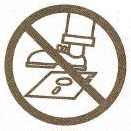|
Prickly Pete posted:What else did she say about it? Is she a zen practitioner who denies rebirth? Does she have some sort of way of reconciling this very core idea of the Buddha's teaching with her own modern understanding? http://www.takeonit.com/question/229.aspx These are the two I got it from. She's an ex-parapsychologhist and a fairly well known "skeptic"
|
|
|
|

|
| # ? May 15, 2024 08:08 |
quote:Could you be accused of cherrypicking from Zen? This is someone who doesn't have the slightest understanding of Buddhist teachings. The first part of that is wrong (the entire notion of a self is rejected, reincarnation is not rebirth) and the second point (of the 'self' she was now being different than the 'self' she was 20 years ago) was rebuked by Buddha himself as wrong view when he went into great detail that he literally meant dying and being reborn in the decaying-in-the-ground sense.
|
|
|
|
|
There is also the official "Secular Buddhist" rejection http://secularbuddhism.org/2013/05/29/a-secular-evaluation-of-rebirth/ Edit: Just if you're interested in it I guess. After having faith struggles I can't quite hop up and accept an after life proposition easily no matter how much I want to. PrinceRandom fucked around with this message at 07:23 on Dec 12, 2013 |
|
|
|
WAFFLEHOUND posted:This is someone who doesn't have the slightest understanding of Buddhist teachings. The first part of that is wrong (the entire notion of a self is rejected, reincarnation is not rebirth) and the second point (of the 'self' she was now being different than the 'self' she was 20 years ago) was rebuked by Buddha himself as wrong view when he went into great detail that he literally meant dying and being reborn in the decaying-in-the-ground sense. The position you're taking is similarly untenable, and you're edging dangerously close to asserting that there are unique identifying intrinsic features which define us. Buddha of course was talking about beings dying physically and being born again physically, but I do not believe it is at all correct to say "in a past life I was this, in a future life I will be that." This is not consistent for exactly the reason she implies through her assertion, which is that "I" am a fluid and interdependently arisen collection of circumstances, which arises and falls based on causes and conditions. Indeed the entire notion of a (ultimate, intrinsic) self is rejected, which is exactly why reincarnation in the sense of "you can be reborn as a frog," the position which she is attacking, is false. "You" cannot be a frog in the future, because a frog in the future arises as a result of a different set of causes and conditions than a human being in the present. The actions of this human being may contribute to the arising of a frog, but aside from this causal stream, there is nothing passed on. I have quoted from commentary on Shantideva in this thread before, but to spare the effort of looking back, I will provide it again: Kunzang Pelden, The Nectar of Manjushri's Speech posted:When we reflect about our present and future lives in the light of such arguments, [we can see that] the entity that dies and passes out of life is not the same as that which is born in the succeeding existence. Conversely, that which takes birth in the next life, wherever that may be, is not the same thing as that which has perished int he previous existence. Simply, your assertion that the Buddha, in expressing that death and rebirth are meant literally, also meant that you yourself are the same being from suckling the teat to circling the drain, is incorrect. They are unrelated statements. They do not address the same questions. It is inarguable that the "I" of right now is distinct and different from the "I" of 10 minutes, days, weeks, months, years, or decades ago. The "I" of right now is distinct and different from what it will be in a mere 10 hours. The present "I" is tired, for example, and exists at night time. The future "I" will hopefully be rested, and exist during the day. In the past, "I" have been not-tired. Even so trivial an example as state of rest can serve as an example, we need not even discuss things like the fact that I am physically different in obvious ways than I was 10 years ago, or 20, or 27. Your insistence on being the rebirth-crusader, vanquishing all those who might reject the concept of a physical rebirth, has led you to a stance on rebirth that is not consistent with the greater Buddhist canon. In your insistence that Buddha taught physical rebirth, you have pigeonholed this particular topic into so narrow a field that it becomes inconsistent with the far more critical details of emptiness and wisdom awareness. I find it particularly peculiar that you have deliberately left off the second paragraph of her answer, quote:Putting it in neuroscientific terms, the brain is constantly building up a story about itself, so 'I' am just a story built by a brain - and the brain changes all the time. Suddenly it switches attention and a different self arises. We take the self to be a permanent thing, but it is impermanent like everything else. This is entirely accurate and true! "I" is a fabrication, a appellation, an obscuration constructed by our minds, and a focus of grasping, attachment, clinging, and so on. This is not contrary to the Buddha's teachings whatsoever. Rather, it is the profound basis of the Buddha's teaching, that there is no distinction between "I" and "you" and "them." All beings are arisen out of the same vast sea of emptiness. We are all interdependently arisen, and none of us exist in an intrinsic sense. What is there to be reborn? Beings die, beings are born. Cause and effect perpetuates. Consciousness manifests based on the causes and conditions accumulated in any given life. That's rebirth. All that being said, she may certainly cherry pick in that I suspect she does make the reductionist argument that karma is moment to moment, does not accumulate, and does not perpetuate on to future lives. But that is not what is at issue here. That is a problem with the metaphysical aspect of karma, and I suspect if she rejects this foundational law, she's cherry picking to be sure. But you haven't made that argument, nor would I have typed all this if you had. Rebirth does not mean a physical rebirth of the same mind or consciousness in a new body. The consciousness of an ant is tangibly different from the consciousness of a human, they do not transfer back and forth. I could make an argument that the ant and the human and the frog are all emanations from the same mindstream, but again, that is not relevant here because emanating from the same mindstream implies differences for exactly the reason she gives: a mindstream is a stream not in that it moves from place to place, but in that if you look at a stream today, and look at it tomorrow, it may appear to be the same stream, but all of the water in that stream is different. In that way, a being perpetuating through a mindstream changes constantly, such that it can never be said to be permanent or "the same," even for an instant.
|
|
|
|
I really should stop concerning myself with after-death occurrences but i feel that if I start to practice regularly this will be consistently dogging me. What would you say is the prime difference between your view and the Secular view Para? What exactly is this sutta referring to as happening? http://www.accesstoinsight.org/tipitaka/sn/sn55/sn55.021.than.html Is it the mindstream? It seems like a mindsteam is something that should be subject to naturalistic observation if it is something that leaves the body and "rejoins the stream" as it were and non-dualistic. Edit: I stole this comment from a reddit thread on Dr. Berzin's discussion "The Importance of Understanding Rebirth and Believing In It." Is this accurate? quote:Thanks, pretty neat. I think one source of possible confusion is using the term "mind" in a Buddhist context vs. how it is used in popular usage. That is, "mind" in a Buddhist context should be seen as a verb, not as a noun, "experiencing," "processing," "streaming," not as a reasonable facsimile for "soul" or some "thing." (Which seems to me how some people use "mind.") So at the risk of putting words in Berzin's mouth, if asked the standard Reddit question, "What continues in rebirth?," I think he'd say "experiencing." PrinceRandom fucked around with this message at 08:46 on Dec 12, 2013 |
|
|
|
PrinceRandom posted:Argh. I'm still fixated on how rebith is possible. Doesn't it depend on some kind of consciousness that trancends the brain? I was reading Susan Blackmore , a Zen practitioners who says that idea flies in the face of all we know in neuroscience. To help you out a little: there is no soul or intrinsic self essence (Indeed even mindstream has become misleading these days). That part really needs to be driven home more than it is in many western circles. Everything is devoid of this intrinsic essence. But for purposes of understanding, there is a self, just not one inherent to someone nor one which exists independently. The self is an illusion that arises (It is in the same way that an illusion is, semantically). In this way there is no rebirth, because there's nothing to be born. Likewise there is no death, because there's nothing to die. There just is. So what is that sutta referring to as happening? Samsarana: a migration, or transmigration. By this it means a relationship between a causal action and the result. This relationship can be seen in the same way that a mind continues along- "I" and my memories are things that arise based on individual thought-moments informed by the world around me and my prior experiences/knowledge. The relationship between two births is similar. Taken as a whole they are joined by causal relationship, experience the same karmas. Each birth is informed by the prior's experiences. Hominid, non-hominid, mundane or supernal- the idea is that Life is. Births arise and fall, but the karmic chain carries on. This is how an enlightened being knows their past births, the past and future births of others: They are able to examine the conditions of experience of another and see the chain that lead to these actions to arise. The same way you see a light turn on and see the conditions that caused that(Switch was flipped, lightbulb was plugged in, etc).
|
|
|
|
I had a lot of trouble reconciling the same things when I first started down this path. Coming from a Christian religious upbringing, there's an overriding sense that you need to believe it all to not be an imposter, yet it was clear to me most of what was being taught didn't ring true. With Buddhism, I couldn't put my finger on why it didn't ring true to me but two things happened. 1.) I started thinking that what I was imputing on this whole rebirth/karma thing was just my closed take on things, boxed in by my anti-belief and natural skepticism. 2.) My teacher said to not worry about it. Just keep meditating and reading. He said, for the things that I didn't "buy", just set them aside and keep practicing and reading. It was (and is) a long slow processes but his karma class and his lojong class certainly challenged pretty much everything I turned out I actually did believe (out of habit). This whole process of dharma seems like the boiled frog approach to me. Just take your time with it and really try, if faced with something you just can't reconcile with what you know to be true, to loosen your hold on what you know and just test the waters with some of these teachings over months and years. Reality isn't as solid as we think it is and science can't give us the safe comfort of certainty we're looking for either, even though it presents itself as if it can. Also, I brought up threads like this one and he said stop reading threads on the internet.
|
|
|
|
PrinceRandom posted:Argh. I'm still fixated on how rebith is possible. Doesn't it depend on some kind of consciousness that trancends the brain? I was reading Susan Blackmore , a Zen practitioners who says that idea flies in the face of all we know in neuroscience. It's fine if you don't believe in rebirth. If you can't understand how it's possible, then just don't understand how it's possible and be okay with that  You can just say "At this point in my life, I don't understand how rebirth is possible" and that's totally fine. Maybe it would be helpful if you asked yourself "let's say I understood how rebirth is possible, then what?". The best place to look is often within our own mind. Edit: If your quest for understanding rebirth is causing you suffering, you should probably abandon it and put your energy into something else. If you like the stuff in Buddhism about virtue and training the mind, do that and come back to rebirth later 
Rhymenoceros fucked around with this message at 14:29 on Dec 12, 2013 |
|
|
|
Rhymenoceros posted:You don't have to either believe or not believe. It's not like rebirth and neuroscience are like two pair of pants, and you have to choose which one to put on. The best you can do is to always be willing to adapt your understanding when you get new information. You said what I said, only better. 
|
|
|
|
PrinceRandom posted:
WAFFLEHOUND posted:Welcome to religion, if we could prove scientifically every claim we make it'd be science. I think it is perfectly understandable to have the doubts you are having. I had them. I still do from time to time. Not doubts necessarily, but lingering questions I suppose. Our idea about rebirth tends to naturally first manifest as the idea of reincarnation for whatever reason, and the rebirth of the Buddha's teaching doesn't always settle in the mind as easily. There is no perpetual self to be reborn. If we can understand that, and then start investigating karma, that will point you in the right direction. I also think meditation is very important for this. I feel like I'm beating that horse to death but insight meditation, and the subsequent clarity you achieve in terms of your understanding of impermanence and no-self, are crucial.
|
|
|
|
Ask me about my past lives as slime mold and gut bacteria and staphylococcus.
|
|
|
|
Rhymenoceros posted:If your quest for understanding rebirth is causing you suffering, you should probably abandon it and put your energy into something else. If you like the stuff in Buddhism about virtue and training the mind, do that and come back to rebirth later You shouldn't "abandon" it; keep it there as something to be mindful of. Absolutely look at continuing practise without rebirth at the forefront. I would highly recommend getting a stronger grasp on sunyata first. Prickly Pete posted:I think it is perfectly understandable to have the doubts you are having. I had them. I still do from time to time. Not doubts necessarily, but lingering questions I suppose. Our idea about rebirth tends to naturally first manifest as the idea of reincarnation for whatever reason, and the rebirth of the Buddha's teaching doesn't always settle in the mind as easily. There is no perpetual self to be reborn. If we can understand that, and then start investigating karma, that will point you in the right direction. I also think meditation is very important for this. I feel like I'm beating that horse to death but insight meditation, and the subsequent clarity you achieve in terms of your understanding of impermanence and no-self, are crucial. Having obtained the slightest bit of ego death through meditation helps so immensely- going through a mystic experience can cement your understanding of dharma. It's far from beating a dead horse. Another thing is that rebirth is not all that touched upon or explained for most. It tends to be a focusing on more secular aspects of the faith. I might argue that it isn't terribly helpful to not start working on the mechanisms of karma and how emptiness works right from the start, but eh.
|
|
|
|
Yeah, it seems like trying to tackle rebirth without understanding anicca and anatta is going to generate wrong view one way or the other.
|
|
|
|
I think a lot of Western atheists come at it from a materialist understanding, where they see the doctrine of Not-Self and are like "Yeah, yeah, I know we don't have souls; we're just brain chemicals. Moving on", and they think they've understood anatta. Then they get hung up on rebirth because they're thinking "But when the brain dies, the self is gone, how can there be rebirth  ". The point of anatta is that the Self is merely an aggregate of lesser, simpler components which temporarily combine to give the sensation of a continuous self. You have the five senses (or at least some of those senses), you have memories, you have emotions, you have thoughts, and you have the sensation of inhabiting a body. Put all of these together and it feels like a whole: a discrete and individual entity that exists within a larger world. We think we have an immutable, congenital, and intrinsic persona underneath it all, that when you take away all thoughts, memories, perceptions, and sensations, there will still be some kind of essence that defines who and what we are. But the truth is that such a thing cannot be found. Without thought, without memory, without perception, without sensation, there appears to be nothing at all. Its void. Emptiness. ". The point of anatta is that the Self is merely an aggregate of lesser, simpler components which temporarily combine to give the sensation of a continuous self. You have the five senses (or at least some of those senses), you have memories, you have emotions, you have thoughts, and you have the sensation of inhabiting a body. Put all of these together and it feels like a whole: a discrete and individual entity that exists within a larger world. We think we have an immutable, congenital, and intrinsic persona underneath it all, that when you take away all thoughts, memories, perceptions, and sensations, there will still be some kind of essence that defines who and what we are. But the truth is that such a thing cannot be found. Without thought, without memory, without perception, without sensation, there appears to be nothing at all. Its void. Emptiness. And each aggregate is itself a temporary and changeable thing. You don't always feel the same emotions, you don't always have the same thoughts and memories, your body doesn't always have the same cells and it doesn't always look the same. So what stays constant throughout your life? In what ways are you the same individual as you were when you were an infant? In what ways will you still be the same individual when you're on your death bed? There is no true essential self that travels across space and time. There is only the moment-to-moment occurrences and happenings. There is anger, there is sadness, there is eating, there is digestion, there is walking, there is sleeping, there is joy, there is boredom, there is aging, and so on. And that's all there is. There is no actual individual entity that is doing all of those things, there is just the occurrence of all of those things, from moment to moment. Even when you die, there will still be the arising of perception, sensation, and so on. You may die, but again, you were just a string moment-to-moment happenings, and those moment-to-moment events of sadness, joy, anger, sight, hearing, touch, taste, lust, boredom, and so on, will still occur elsewhere. It's like if a baseball game comes to an end, there is still the concept of baseball, and there are still other baseball games being played. That particular baseball game, which took place at THAT field on THAT afternoon with THOSE exact players and THOSE exact spectators, ceased. But baseball continues elsewhere. So YOU, as a particular arrangement of sensation, perception, etc. will cease, but sensation and perception and so on will continue elsewhere. There will be new arising of happiness, fear, arousal, and what not.
|
|
|
|
Mr. Mambold posted:Are you really dense, or what. Yes, it depends on consciousness that transcends the brain, that's the whole loving point. How is this anything but eternalism? A view explicitly rejected by the Buddha. Ugh, this thread.
|
|
|
|
Blue Star posted:Even when you die, there will still be the arising of perception, sensation, and so on. You may die, but again, you were just a string moment-to-moment happenings, and those moment-to-moment events of sadness, joy, anger, sight, hearing, touch, taste, lust, boredom, and so on, will still occur elsewhere. It's like if a baseball game comes to an end, there is still the concept of baseball, and there are still other baseball games being played. That particular baseball game, which took place at THAT field on THAT afternoon with THOSE exact players and THOSE exact spectators, ceased. But baseball continues elsewhere. So YOU, as a particular arrangement of sensation, perception, etc. will cease, but sensation and perception and so on will continue elsewhere. There will be new arising of happiness, fear, arousal, and what not. Is this really it? Does the metaphor hold true? Serious question, as rebirth isn't anything I have yet studied. I have experienced the inquiry that you talked about before this and came to the same conclusions. This seems deceptively simple, though.
|
|
|
Yiggy posted:How is this anything but eternalism? A view explicitly rejected by the Buddha. From the Yogacara argument of basal consciousness this is dead on though.
|
|
|
|
|
Yiggy posted:How is this anything but eternalism? A view explicitly rejected by the Buddha. I dunno how an utter cessation of consciousness can not be annihilationism. It seems to be the middle-way conundrum.
|
|
|
|
PrinceRandom posted:I dunno how an utter cessation of consciousness can not be annihilationism. It seems to be the middle-way conundrum. Because nothing is being destroyed. "Consciousness" is what we call one of the conditions arising from the arrangement of the aggregates that compose "us". When the state of those aggregates changes, sometimes consciousness no longer arises. edit: Consciousness, like "self" is a label that we apply to a configuration of reality. Nothing is created or destroyed when we die. The idea that consciousness is its own thing, that is a thing in and of itself is similar to the idea of the self. It is an illusion, or convenient label, but it is not a tangible or distinct thing. Snak fucked around with this message at 01:49 on Dec 13, 2013 |
|
|
|
PrinceRandom posted:I dunno how an utter cessation of consciousness can not be annihilationism. It seems to be the middle-way conundrum. Consciousness is not self. Consciousness is one of the aggregates (khandas or skhandas) that we cling to as self in our deluded state. edit: Damnit snak ^^ beat me to it while I was lost in the swamps of access to insight That link to the study guide is good though. If you can get over Thanissaro's insistence on translating Dukkha as "stress" instead of suffering, which always bugs me. People Stew fucked around with this message at 01:56 on Dec 13, 2013 |
|
|
|
PrinceRandom posted:I dunno how an utter cessation of consciousness can not be annihilationism. It seems to be the middle-way conundrum. There's nothing to cease. There's nothing to annihilate. Nothing stops, nothing starts. Consciousness is an unceasing stream of experiences. Any illusion of "my consciousness" or "your consciousness" is a flawed perception limited by conceptual thinking. Primordially self-aware emptiness continues, and while "your" or "my" consciousness may seem to stop, the truth is there never was a "your" or "my" consciousness to do that. Consciousness is merely an illusory aggregate. That's why the rebirth thing is not internally inconsistent with impermanence. One process ends and another begins, related through the causes and conditions but distinct in substance, form, and nature. One being "dies" and another being "is born" but neither being exists inherently, both were processes of dependent origin. Metaphysically, we can assert that the process of karma, being inscrutable, is beyond the scientific or materialistic stance. Certainly I do not advocate for a staunch materialist view. Hell, many tantric Buddhist traditions make explicitly clear that the material and immaterial world (the world of our dreams, our imagination, things we visualize, and so on) are equally illusory, equally dependently originated, and thus equally valid. But regardless of that, to bring it around to a point that Prickly Pete has made, the thing is that it need not be accepted by you presently right this moment. It is entirely possible that you at this moment cannot accept it, or are unable or unwilling to accept it, due to your karma, due to the causes and conditioning that have brought about this present "you." But this present you is as impermanent as the past yous and future yous. I would advise against making any core claims like "I cannot accept this ever." That's simply untrue, though you may believe it to be true. The thing about the path is it is self-revealing. If you follow the path, as you follow it, more of it becomes clear. At the onset, perhaps nothing seems reasonable at all, but as you continue, it makes sense why this or why that. Meditative contemplation is an extremely useful tool. I would personally advocate rather than meditative contemplation though to focus also on developing genuine compassion and care for other beings. Frankly, all the philosophical stuff will come with time. There's no need to force it all and try to understand it right now. The more important thing is that you develop compassion and understanding and love for other sentient beings. From one perspective, in lineages that focus on such as merit accumulation, as you practice genuine dharma you accumulate merit which removes obstacles and ensures you will accomplish what you're setting out for. After all, if "negative karma" results in bad conditions, then "positive karma" results in good. But aside from that, the fact is simply that if you're practicing genuine dharma, all of this will become evident with time. Even just saying basic aspiration prayers every morning, and truly meaning them, can lead to good results. Just developing a desire for all sentient beings to be genuinely happy and free from suffering will necessarily lead to your own happiness and freedom from suffering. Contemplating that will lead to a development of a true understanding of the mechanisms in play. By benefiting others, we benefit ourselves. By releasing our attachment to our own benefit, and truly dedicating to service of others, we gain inestimably and it helps us far more than whether or not we understand precisely the mechanism of karma and rebirth. We don't need to perfectly understand the deep philosophical principles. It will happen on its own without effort, with right practice and devotion. So it's good to be interested in those things, and it's not wrong to want to sort out these hangups, but at the same time, it's not really a productive thing if it's causing consternation or suffering. Incidentally this is one of the main reasons I contest with some assertions that in order to "be Buddhist" one has to accept unwaveringly certain aspects of doctrine or dogma. The investigation of Buddhism is itself the practice of a Buddhist. A person who already understands Buddhism perfectly has no need for such a title. I don't like excluding people from "the fold" based on their uncertainty or hesitance to accept concepts like literal rebirth. There is certainly a problem with people claiming to be Buddhist while outright rejecting such things, but I don't think skepticism or uncertainty is a problem. Edit: just read those things up there because that's way more concise. Paramemetic fucked around with this message at 02:01 on Dec 13, 2013 |
|
|
|
Okay, ya'll are making sense. I think, as you say, I'm not quite at the acceptance stage because I'm still dealing with existential anxiety and depression and doubt.
|
|
|
|
Prickly Pete posted:Consciousness is not self. Consciousness is one of the aggregates (khandas or skhandas) that we cling to as self in our deluded state. Well, I'm not super happy with my explanation, because "consciousness" is a very loaded word in this context. I'm sure that some of the more knowledgeable contributors to this thread can explain it more accurately. I have been trying to find a good source to back up what I said and I haven't quite found it yet. PrinceRandom posted:Okay, ya'll are making sense. I think, as you say, I'm not quite at the acceptance stage because I'm still dealing with existential anxiety and depression and doubt. I think that one of the reasons simple sitting meditation can strengthen a practice is because of the calming effect it has. Unfortunately, many people will only get that far, mistakenly thinking that meditation is good for feeling calm. I think that it is helpful because it gives us a chance to experience ideas that can be scary from a safe place. By our very nature as unenlightened beings, we have wrong views, and ideas that challenge our world view can make us feel threatened. When we encounter evidence that our views are wrong in every-day life it can be very upsetting. Insight meditation allows us to encounter these ideas in a nonthreatening way. Even if we do not yet see them to be true, it is usually not upsetting to explore them in this way. Snak fucked around with this message at 02:14 on Dec 13, 2013 |
|
|
|
Yiggy posted:How is this anything but eternalism? A view explicitly rejected by the Buddha. You're a theorizer not a knower. The Buddha had no views. The Buddha recalled his past lives. When you do likewise, you'll know instead of believe. Ugh.
|
|
|
|
Is the best use of our time in this life to figure out what happens when it ends (Or before it began)? I think that's about as far from present moment as we can get. Of course it's difficult because there's a sense of urgency, "Oh you'll never be a real buddhist unless you believe Rebirth with conviction." Combined with, "Also the wrong view will make you go to Buddhist hell." That's the challenge, come back to the present moment. Feel the fear of these things and process it. Then, when ready, let it go. It's hard to overcome the value judgments of others. Just wanting to be a real hardcore buddhist can be a sense of craving in it self, one that reality can easily strip away. It's easier just to forget about it and live life now. Don't avoid this thing, I think about Rebirth a lot, Karma not so much, because it's very acceptable to me already. However, when I catch myself going in circles about it, I just take 3 conscious breaths and break the cycle. It sometimes takes two or three tries, but it works. Why cause myself a bunch of grief because forums users (And probably many other hardcore dudes in real life) think I can't be a real buddhist? Why worry about it at all? I'm going on my first week-long retreat tomorrow and am looking forward to it. Any last minute advice, thread?
|
|
|
|
Mr. Mambold posted:The Buddha had no views. This is such crap. I think my problem with most of the western converts is that in their zeal they lose any interest in examining the tradition, its broad deviations throughout history and the contexts surrounding those changes. In doing so they're able to conveniently see Buddhism through a lens of their own construction, arising dependent on the views they carried with them from before they were drawn to Buddhism. These views on a continuing consciousness linking birth to birth were shot down by the Buddha. Later in the tradition's history you see the idea pop up again and again. Perhaps earliest and most explicitly you see it with the Pudgalavadins, who were widely lambasted by the other schools of Buddhism for their wrong view. It happens again and again throughout history, but its always just a new label for a Self that certain individuals need in order for samsara to make any sense. A long tradition of Knowers thought it was crap, because it is crap. But because it is comforting crap, it will appear again and again, no matter how many revivalist movements shut it down, because its Buddhism's back door for an eternal life. And humans, the flawed creatures we are, can't walk away from that desire.
|
|
|
|
Razage posted:I'm going on my first week-long retreat tomorrow and am looking forward to it. Any last minute advice, thread?
|
|
|
|
ObamaCaresHugSquad posted:Set yourself tiny little meditative goals for each practice session (depends totally on the type being practiced I suppose). This helps counteract the daydreaming all day thing that happens if you just go in thinking sitting on a cushion at a retreat is good enough in itself. You get out what you put into it. Also go for long walks interspersed with your sitting meditation if they let you. Well I have no idea what the day to day itinerary is going to be. I think they do this on purpose so one can't develop expectations. I'll make sure to think of my intention as I sit down though, I try to do that each time I sit anyway (Admittedly sometimes I forget). I think the plan is to do sections of sitting and walking, so that's good.
|
|
|
|
Mr. Mambold posted:You're a theorizer not a knower. The Buddha had no views. The Buddha recalled his past lives. When you do likewise, you'll know instead of believe. Ugh. I think he had views. Right view anyway. I think the views that are cautioned against should be specified as speculative views.
|
|
|
|
How do you guys make sense of the Mahayana Mahaparinirvana Sutras that show Buddha talking about a "True Self"? Are those non-canonical? Are they offering a different perspective on the same topic? Admittedly I've only briefly perused some excerpts and commentaries but going through them definitely confused me a little.
|
|
|
|
The Dark Wind posted:How do you guys make sense of the Mahayana Mahaparinirvana Sutras that show Buddha talking about a "True Self"? Are those non-canonical? Are they offering a different perspective on the same topic? Admittedly I've only briefly perused some excerpts and commentaries but going through them definitely confused me a little. Canonical depends on who you're talking to. What we know of the texts originating from that time, ~200 CE, is that often monks would compose them through a process of visualized meditation called buddhanusmirti, where they would visualize the Buddha and receive new teachings from him. The writings of these meditators were then attributed directly to the Buddha, despite very commonly diverging in both form and content from the earliest texts in the Pali Cannon. Reports from pilgrims at that time, Mahayanist monks were not an explicitly separate sect from what was then considered the main-stream Buddhists. At that time, monks identified themselves primarily by which Vinaya (monastic code) they followed, and the pilgrims report that Mahayanists and Main-stream buddhists coexisted and lived in the same monasteries. Mahayanists would typically spread their ideas and beliefs through shared texts generated through this process of Buddhanusmirti and meet in private, because for most of the monks at that time these were heterodox ideas. (Interestingly enough, this is also a large influence behind why Mahayana Buddhism is what predominantly spread Eastward. Pilgrims to India wanted texts to bring home, and Mahayanists had texts in spades). So essentially, this text is later doctrine. Many Mahayanists no doubt see it as canonical, but evidence of Mahayanists self-identifying as a sect of Buddhism does not begin to appear in the material and archaeological record until 500-700 CE, almost a millennium after what is supposed to be the Buddha's death. So essentially the value of the text is going to depend on who you ask and what axes they have to grind.
|
|
|
|
I'm not Nichiren; my take on it is as another quirk of theology from the same school that says all other schools of buddhism are corrupt dharma. Still, it doesn't strike as terribly misleading. The "true self" expressed in the sutra (Available here) can be rationalized as either an expression of the tathagatagarbha or the Dharmakaya. v Quantumfate fucked around with this message at 06:54 on Dec 13, 2013 |
|
|
|
I don't know if you have heard about this book Yiggy but it sounds like it would be right up your alley. How Theravada is Theravada? Exploring Buddhist Identities Some of the people over at the Early Buddhism forum at Dhammawheel where really impressed with it.
|
|
|
|
I guess something I don't understand is how I don't achieve a semblance of Nirvana on death then? Haven't I escaped living again by dying? I won't be experiencing a life again which seems to be the goal? Am I doing it solely for some future stranger?
|
|
|
|
The same way you don't attain a semblance of Nirvana upon going to sleep. Each time you sleep or lose consciousness, you die. With every new arising through or experience you die. You live your whole waking life "Solely" for some future stranger. Death of the worldly body is not death of that life. That life suffers again and again to be reborn. Why worry about getting a job when you'll cease to be the next time something new happens or you fall asleep? That's just doing it for the benefit of some future stranger, after all.
|
|
|
|
I go to sleep with the expectation that I'll wake up. If I understand it correctly, I'm not going to wake up from death.
|
|
|
|
You don't wake up from sleep however, the you that awakes is entirely different. When you die, you enter into a new birth, with a you that is entirely different.
|
|
|
|
This is why Buddhist teachers who can explain things simply and using few words are a precious treasure.
|
|
|
|
|
I'm trying to use few words here, see how that goes?
|
|
|
|

|
| # ? May 15, 2024 08:08 |
|
But there's been three phd dissertations between the original question and that post. It's not just you, I really think this thread is prone to wanting to solve and explain every broad theological topic whenever a a question is asked, and sometimes I think a partially inaccurate yet useful answer is better than a totally complete answer which is going to go over the heads of people without a really strong academic background in Buddhism.
|
|
|
|



























